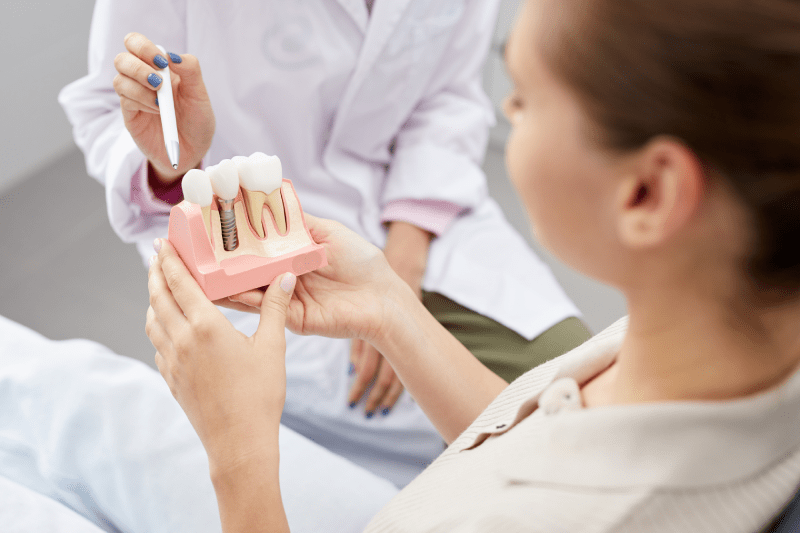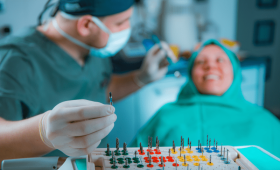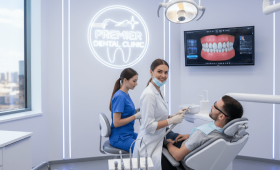What is a Dental Implant and How Does it Work?
A dental implant is a small screw made of titanium that is surgically placed into the jawbone to replace missing teeth. This screw functions just like a natural tooth root and biologically fuses with the jawbone (osseointegration) to form a permanent and solid foundation. Once this process is complete, a custom-made prosthetic tooth (crown, bridge, or denture) is placed on top. In this way, patients gain both an aesthetic smile and full functional chewing ability.
Why is Dental Implant Treatment Popular in Bristol?
Bristol is a developed city in the UK with many clinics that have highly trained dentists and modern technology. The clinics in the city use the latest 3D imaging and digital dentistry technologies to offer their patients personalized treatment plans. Implant specialists in Bristol generally have many years of experience and follow the most up-to-date knowledge in the field of implantology. These factors make Bristol a reliable and preferred center for dental implant treatment.
How Do I Know If I Am a Suitable Candidate for a Dental Implant?
To determine if you are a suitable candidate for a dental implant, a comprehensive evaluation is required. Your dentist will check if your jawbone has sufficient density and volume to support the implant. It is also important that you do not have active oral health issues such as gum disease and that your general health is suitable for the surgical procedure. Conditions like smoking and uncontrolled diabetes can negatively affect the success of the implant. Therefore, you should undergo a detailed examination by a specialist.
What is the Cost of a Single Dental Implant in Bristol?
The cost of a single dental implant in Bristol can generally range from 1800 to 3500 Pounds. This price includes the implant itself (screw), the abutment (connecting piece), and the crown (artificial tooth). However, factors affecting the price include the clinic’s location, the brand of the implant used, the dentist’s experience, and whether additional surgical procedures (such as bone grafting) are required. It is important to get a written cost breakdown from the clinic before starting treatment.
How Do Prices Change for Multiple Dental Implants?
When multiple dental implants are needed, the total cost is naturally higher than the cost of a single implant, but the cost per unit is usually slightly lower. Many clinics in Bristol may offer discounted package prices for multiple implant treatments. For example, a bridge placed on two implants may be more affordable than the total cost of two separate implants. Such situations vary according to the personalized treatment plan and the clinic’s pricing policy.
What are the Main Factors Affecting Implant Prices?
The most important factors affecting implant prices include the brand and quality of the implant, the number of implants, and the bone condition of the area where the implant will be placed. If your bone density is insufficient, the cost of additional procedures such as bone grafting or sinus lifting will be added to the price. In addition, the dentist’s level of expertise, the technological facilities offered by the clinic, the quality of the materials used throughout the treatment, and post-treatment check-ups are also factors that determine the overall cost.
Does the Dental Implant Operation Hurt?
The dental implant operation is usually performed under local anesthesia, so you will not feel any pain or discomfort during the procedure. Only pressure and vibration may be felt. It is normal to have a little pain and swelling after the procedure, but these conditions can usually be easily controlled with over-the-counter painkillers. Thanks to modern surgical methods, the vast majority of patients state that the operation went more smoothly than they expected.

How Long Does the Implant Treatment Process Take?
The implant treatment process is generally a phased process and can take several months in total. The first stage is the placement of the implant into the jawbone and the healing of this procedure, which usually takes 30-60 minutes. After that, a healing period of 3 to 6 months is awaited for the implant to fully fuse with the bone. Finally, the prosthetic tooth is placed on the implant. This process may vary depending on the individual healing rate and the additional procedures (such as bone grafting) that are required.
Are Payment Plans Available for Dental Implants in Bristol?
Yes, many dental clinics in Bristol offer various payment plans to help patients more easily afford the cost of implant treatment. These plans generally allow the total cost of the treatment to be spread over a certain period and may sometimes include interest-free installment options. Discussing the financing options offered by your clinic in detail before starting treatment will help you find the most suitable solution for your budget.
Does Health Insurance Cover the Cost of an Implant?
In the UK, dental implants are generally not covered by the NHS (National Health Service) as they are considered a cosmetic procedure. However, in exceptional cases, NHS support may be provided for individuals who have lost teeth due to a facial injury or a congenital condition. Private health insurance, on the other hand, may cover a portion or all of the implant cost depending on the policy. It is important to contact your insurance company to learn about the coverage of your policy before starting treatment.
What is the All-on-4 Implant System and What is its Price?
All-on-4 is a revolutionary implant solution for patients who are missing all their teeth or have severe tooth loss. In this technique, a fixed prosthesis for the entire jaw is placed using only four implants. This method can eliminate the need for bone grafting for patients with insufficient bone volume. The cost of an All-on-4 system in Bristol can range from 8000 to 20,000 Pounds, depending on the complexity of the treatment and the materials used.
Why Should I Choose a Specialist Clinic for Implant Treatment in Bristol?
Choosing a specialist clinic for implant treatment in Bristol is vital for the success and safety of the treatment. Specialist clinics work with experienced dentists who have in-depth knowledge in implantology and use the latest technological equipment. In this way, a detailed analysis of your jaw structure is made and the most accurate treatment plan is created. In addition, a specialist clinic is more prepared to manage possible complications and offers you a safer treatment process.
What is the Success Rate of an Implant?
The success rate of dental implant treatment is generally very high, over 95%. However, this success depends on many factors such as the patient’s oral hygiene, smoking habits, general health status, and the dentist’s experience. With regular dental check-ups and proper care, the lifespan of implants can be extended. In case of failure, there are solutions such as re-placing the implant.
How Does the Post-Implant Healing Process Work?
The post-implant healing process can generally range from a few days to a few weeks. It is normal to experience some mild pain, swelling, and bruising in the first few days. During this process, using the painkillers recommended by your dentist and applying a cold compress will help you feel more comfortable. Your dentist will advise you to eat soft foods and gently clean the treated area to speed up the healing process. Full healing and bone fusion can take a few months.
Is Pain and Swelling After Implant Treatment Normal?
Yes, it is quite normal and expected to experience mild pain and swelling after dental implant treatment. This is your body’s natural response to the surgical procedure. It usually becomes most noticeable within the first 24-48 hours and then gradually subsides. To speed up the healing process, you can apply a cold compress and use painkillers regularly as recommended by your dentist. If the swelling and pain last longer than a few days, it is important to consult your doctor.
What is the Lifespan of a Dental Implant?
The lifespan of a dental implant can be permanent for life with proper care and regular check-ups. The implant itself is made of titanium, so it is very durable and does not cause a problem as long as it fuses with the bone. However, the prosthetic teeth (crown or bridge) placed on the implant can wear out like natural teeth and may need to be replaced after about 10-15 years. Regular oral hygiene and dental visits are critical for the longevity of the implant.
Do Implant Teeth Feel Like Real Teeth?
Yes, dental implants feel and function like real teeth. Since they are tightly integrated into the jawbone, they provide a stable and natural feeling. The crowns placed on the implant are specially produced to mimic the appearance, color, and shape of natural teeth. In this way, you can comfortably chew, talk, and smile with your implant teeth. Many patients state that their implants are indistinguishable from their natural teeth and that their chewing power has almost completely returned.
Can Patients with Bone Loss Get Implants?
Yes, patients with bone loss can also get implants. Loss of volume and density in the jawbone usually occurs over time after missing teeth are extracted. In this case, additional surgical procedures such as bone grafting (bone powder) or sinus lifting are first applied for the implant to be successfully placed. These procedures aim to create the solid bone foundation required for the implant. These additional treatments are critical for the long-term success of the implant.
What is Bone Grafting (Bone Powder) and When is it Necessary?
Bone grafting is a surgical procedure applied in cases where there is not enough bone volume for dental implant placement. In this procedure, bone material (bone powder) obtained from the patient’s own body, a human donor, or synthetically is placed in the implant area. This material promotes the growth of new bone tissue and creates a foundation where the implant can be placed securely. It may take a few months for the graft to fuse with the bone.
What Stages Does the Implant Procedure Involve?
The dental implant procedure generally consists of three main stages: First, a preliminary evaluation and treatment plan are made. The second stage is the surgical placement of the implant into the jawbone. Following this stage, a healing process is awaited for the implant to fuse with the bone. In the third and final stage, the abutment and the permanent prosthetic tooth are placed on the implant. This process progresses with regular check-ups.
What Happens in Case of Dental Implant Treatment Failure?
Failure in dental implant treatment usually occurs when the implant does not fuse properly with the jawbone. This can cause the implant to become mobile or dislodged. In case of failure, the dentist surgically removes the implant. A waiting period is required for the area to heal, and the area is re-evaluated for a second implant attempt. The failure rate is quite low.
Which is the Best Implant Clinic in Bristol?
Determining the best implant clinic in Bristol depends on personal needs and preferences. However, there are some important criteria to consider when choosing a clinic. These include the clinic’s level of expertise in implantology, the dentist’s experience and references, the technological equipment used, and hygiene standards. Clinics that are members of professional organizations such as the British Dental Association (BDA) generally offer high standards of service. It is useful to get consultations from different clinics before making a decision.
Are There Side Effects of Getting an Implant?
The most common side effects of dental implant treatment are mild swelling, bruising, and pain in the treatment area. These usually subside on their own within the first few days and can be controlled with over-the-counter painkillers. Rare but serious side effects include infection, nerve damage, and failure of the implant to fuse with the jawbone. These risks can be minimized with the right surgical technique and good oral hygiene.
What is the Difference Between an Implant and a Bridge?
A dental implant and a dental bridge are two different methods used to compensate for missing teeth. A dental implant is a permanent solution placed in the jawbone to replace a missing tooth and works without harming the adjacent teeth. A dental bridge, on the other hand, relies on the adjacent teeth on either side of the missing tooth, and these teeth need to be reduced to support the bridge. The implant is a more advantageous option in terms of preserving adjacent teeth.

What Materials are Implant Teeth Made Of?
Dental implants are generally made of titanium, which is biologically compatible and easily accepted by the body. Titanium forms a strong bond with the jawbone, creating a long-lasting foundation. The prosthetic teeth (crowns) placed on the implant are usually made of aesthetic and durable materials such as porcelain or zirconium. These materials best mimic the appearance and function of natural teeth.
Can Dental Implant Treatment Be Applied at Any Age?
There is no upper age limit for dental implant treatment; adults of any age who are in good general health can receive this treatment. However, since the jawbone where the implants will be placed must have completed its development, implants are generally not performed on individuals in adolescence. Age alone is not an obstacle; the person’s general health status and oral structure are the most important determinants of suitability for treatment.
Can I Get a Loan for Implant Treatment in Bristol?
Yes, many dental clinics in Bristol offer financing options for patients who have difficulty covering the cost of implant treatment. This can be through a bank loan or through financial institutions the clinic is affiliated with. Before starting treatment, you can discuss this issue with your clinic to see if they can create a special payment plan for you. This option eases the financial burden by dividing high costs into more manageable installments.
How is the Cleaning of Implant-Supported Prosthetics Done?
The cleaning of implant-supported prosthetics should be done with daily brushing and flossing, similar to the cleaning of natural teeth. Keeping the area around the implant clean is very important to reduce the risk of peri-implantitis (inflammation around the implant). Your dentist may recommend products such as special implant brushes, interdental brushes, or water flossers to effectively clean the gum line around the implant. These products help prevent plaque buildup and potential infections around the implant, thus extending its lifespan.
Is There a Consultation Fee Before Starting Implant Treatment?
Some dental clinics in Bristol may charge a fee for the initial consultation appointment before starting implant treatment. This fee covers the time and effort the dentist spends on an oral examination, X-rays, and other evaluations. However, some clinics offer this initial consultation for free, making it easier for patients to get information. Asking the clinic about its policy on this issue before starting treatment will prevent you from encountering unexpected costs.
In What Situations Cannot an Implant Be Applied?
Situations where implant treatment cannot be applied generally include uncontrolled chronic diseases (such as severe diabetes, heart diseases, etc.), insufficient volume and density in the jawbone to support the implant, or active gum diseases. In addition, smoking, alcohol addiction, and the use of some medications can also negatively affect the success of the implant. In such cases, alternative treatment methods (bridge, denture) are evaluated instead of an implant.
How is the Best Result Achieved with a Dental Implant?
Achieving the best result with a dental implant depends on the right treatment planning, an experienced dentist, and the patient’s attention to post-treatment care. A detailed examination and 3D imaging before treatment ensure that the implant is placed in the most suitable position. After treatment, regular tooth brushing, flossing, and periodic dental check-ups extend the life of the implant and help preserve the aesthetic result.
Is it Sensible to Travel to Bristol for a Dental Implant?
Getting a dental implant in Bristol can offer some advantages compared to other cities in the UK. The potential to find the same quality of service at more affordable prices is high in Bristol compared to larger and more expensive cities like London. The city’s transportation facilities and proximity to the airport make it convenient for patients coming from surrounding cities. For this reason, Bristol can be an attractive option by offering both cost-effectiveness and quality service.
What Technologies are Used in Implant Treatment?
Modern dental clinics in Bristol use advanced technologies to increase the success of implant treatment. These technologies include CBCT (Cone Beam Computed Tomography) devices that allow the jaw structure to be imaged in three dimensions, surgical guides that ensure the implant is placed at the most accurate angle, and CAD/CAM systems that help produce prosthetic teeth quickly and precisely. These technologies make the treatment process safer and more predictable.
Is There a Risk of Oral Infection During Implant Treatment?
As with any surgical procedure, there is a risk of infection during a dental implant operation. However, this risk is minimized in modern clinics thanks to high hygiene standards and sterilization methods. Your dentist may prescribe antibiotics to you before the operation to reduce the risk of infection. After treatment, it is critically important for the patient to pay attention to oral hygiene and follow the doctor’s instructions to minimize the risk of infection.
Are Special Products Required for the Care of a Dental Implant?
Some products specially designed for the care of dental implants can be useful in situations where natural tooth brushing is not sufficient. Your dentist may recommend products such as special implant brushes, interdental brushes, or water flossers to effectively clean the gum line around the implant. These products help prevent plaque buildup and potential infections around the implant, thus extending its lifespan.



